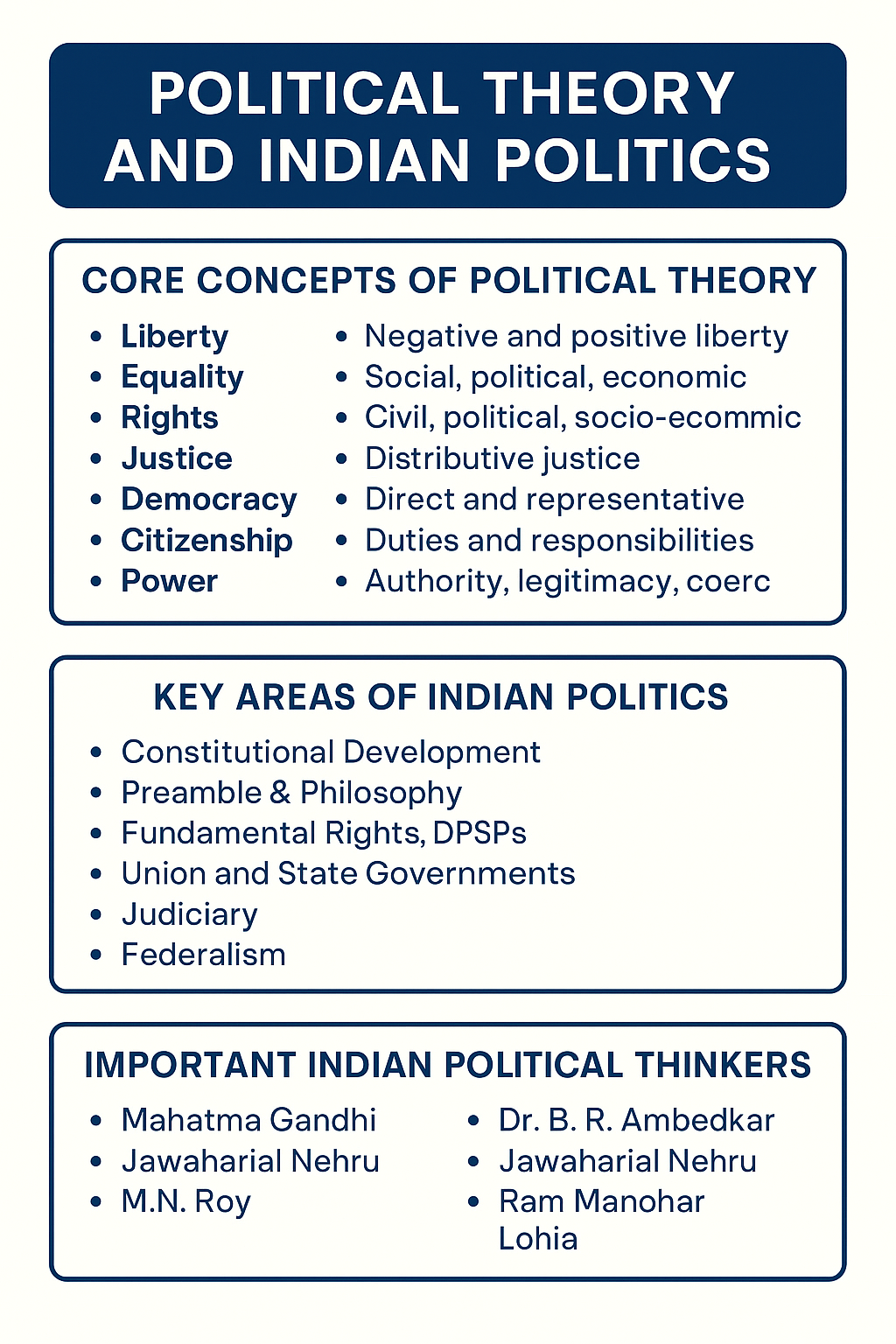
19 Jul Political Theory and Indian Politics
Political Theory and Indian Politics – UPSC CSE
Political Theory and Indian Politics is a foundational area of study for aspirants preparing for the UPSC Civil Services Examination, particularly for General Studies Paper II and Political Science and International Relations (PSIR) optional. This subject helps candidates build conceptual clarity and understand the philosophical and institutional framework of Indian democracy.
What is Political Theory?
Political theory is a branch of political science that deals with the ideas, principles, and philosophies behind political systems. It addresses fundamental questions like: What is justice? What is the role of the state? How should power be distributed? Political theory provides the tools to critically examine political ideologies, institutions, and behaviors.
Core Concepts of Political Theory
- Liberty: Negative and positive liberty; freedom of expression, belief, and movement.
- Equality: Social, political, and economic equality; affirmative action; gender justice.
- Rights: Civil, political, and socio-economic rights; natural vs legal rights.
- Justice: Distributive justice; Rawlsian theory of justice.
- Democracy: Direct and representative democracy; deliberative and participatory models.
- Citizenship: Duties and responsibilities; global citizenship; multiculturalism.
- Power: Authority, legitimacy, coercion; elite and pluralist theories.
Indian Politics in the UPSC Syllabus
Indian Politics covers the evolution, structure, and functioning of India’s political system. It is grounded in the Indian Constitution and extends to various institutions, ideologies, movements, and personalities that shape governance.
Key Areas:
- Constitutional Development: Historical evolution, Constituent Assembly debates.
- Preamble & Philosophy: Sovereignty, secularism, socialism, democracy, republic.
- Fundamental Rights and Duties, Directive Principles of State Policy (DPSPs).
- Union and State Governments: President, PM, Parliament, Governor, CM, State Legislature.
- Judiciary: Supreme Court, Judicial Review, Judicial Activism.
- Federalism: Centre-state relations, Inter-State Council, Finance Commission.
- Election and Political System: Election Commission, electoral reforms, political parties, pressure groups.
- Public Policy: Policy formulation and implementation in India.
Indian Political Thought
This section explores contributions of Indian thinkers to political ideas and institutions:
- Mahatma Gandhi: Swaraj, non-violence, trusteeship.
- Dr. B.R. Ambedkar: Social justice, constitutionalism, annihilation of caste.
- Jawaharlal Nehru: Democratic socialism, secularism, non-alignment.
- M.N. Roy: Radical humanism, critique of communism.
- Ram Manohar Lohia: Socialism with Indian characteristics, caste and equality.
Why is this Topic Important for UPSC?
- Direct questions in GS Paper 2 on constitutional philosophy and political concepts.
- Crucial for Essay Paper to handle abstract topics like liberty, equality, and justice.
- Overlaps significantly with PSIR Optional Paper I.
- Useful for Interview stage where understanding of Indian polity and ideology is assessed.
UPSC Mains PYQs (Previous Year Questions)
- 2021: What is the role of Indian political thought in shaping the Constitution of India?
- 2020: Discuss the concept of Liberty in Indian democracy.
- 2019: Analyze the relevance of Rawls’ theory of justice for India.
- 2018: Do you think Indian secularism is different from Western secularism? Explain.
Probable Questions for UPSC 2025
- Evaluate the role of political theory in building democratic values in India.
- Compare and contrast the ideas of Gandhi and Ambedkar on social justice.
- What is the relevance of Indian political thought in contemporary governance?
- Is liberty meaningful without equality? Discuss in the Indian context.
Conclusion
Political Theory and Indian Politics helps students understand not just how the political system functions, but why it is designed in a particular way. For UPSC aspirants, it enhances analytical and philosophical depth required in GS, essay, and optional papers. A strong grasp over this topic also improves the ability to interpret government policies and constitutional developments critically.
Keywords: Political Theory and Indian Politics UPSC, GS Paper 2, PSIR optional, Liberty, Justice, Constitution of India, Indian political thought




No Comments